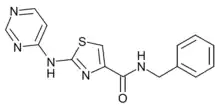Thiazovivin
Thiazovivin is a drug which acts as a potent and selective inhibitor of the enzyme Rho kinase. It is used alongside a cocktail of other growth factors and modulators in cell culture techniques for the generation of induced pluripotent stem cells, which can then be used for a wide variety of applications.[1][2][3][4]
 | |
| Identifiers | |
|---|---|
| |
| CAS Number | |
| PubChem CID | |
| ChemSpider | |
| ChEMBL | |
| CompTox Dashboard (EPA) | |
| ECHA InfoCard | 100.236.307 |
| Chemical and physical data | |
| Formula | C15H13N5OS |
| Molar mass | 311.36 g·mol−1 |
| 3D model (JSmol) | |
| |
| |
See also
References
- Lin T, Ambasudhan R, Yuan X, Li W, Hilcove S, Abujarour R, et al. (November 2009). "A chemical platform for improved induction of human iPSCs". Nature Methods. 6 (11): 805–8. doi:10.1038/nmeth.1393. PMC 3724527. PMID 19838168.
- Donai K, Inagaki A, So KH, Kuroda K, Sone H, Kobayashi M, et al. (March 2015). "Low-molecular-weight inhibitors of cell differentiation enable efficient growth of mouse iPS cells under feeder-free conditions". Cytotechnology. 67 (2): 191–7. doi:10.1007/s10616-013-9686-8. PMC 4329295. PMID 24682663.
- Mohseni R, Shoae-Hassani A, Verdi J (May 2015). "Reprogramming of endometrial adult stromal cells in the presence of a ROCK inhibitor, thiazovivin, could obtain more efficient iPSCs". Cell Biology International. 39 (5): 515–8. doi:10.1002/cbin.10411. PMID 25490878. S2CID 24813753.
- Cheng L, Lei Q, Yin C, Wang HY, Jin K, Xiang M (2017). "Generation of Urine Cell-Derived Non-integrative Human iPSCs and iNSCs: A Step-by-Step Optimized Protocol". Frontiers in Molecular Neuroscience. 10: 348. doi:10.3389/fnmol.2017.00348. PMC 5670152. PMID 29163026.
This article is issued from Wikipedia. The text is licensed under Creative Commons - Attribution - Sharealike. Additional terms may apply for the media files.